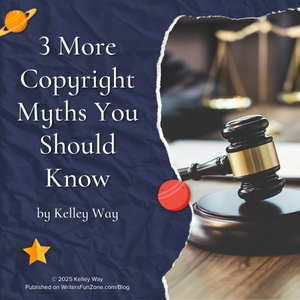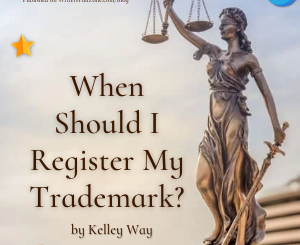3 More Copyright Myths You Should Know by Kelley Way
 Let’s welcome back monthly columnist Kelley Way as she shares with us “3 More Copyright Myths You Should Know.” Enjoy!
Let’s welcome back monthly columnist Kelley Way as she shares with us “3 More Copyright Myths You Should Know.” Enjoy!
***
My previous article on copyright myths proved to be a hit, so I’m following it up with three more myths related to copyright:
1. If it’s online, it’s free to use
This myth is pervasive.
It’s so easy to copy and download things online. People assume the content must be free to use.
Unfortunately for them, this is not the case.
Posting something online doesn’t remove copyright protection, it just makes it easier for people to infringe.
In addition, bad actors will often post other people’s content online, so you can’t trust that the person who posted it is the same person who owns the copyright.
If you’re looking for content you can use, go to a reputable website where copyright owners have given permission for others to use their content.
2. Copyright lasts forever
I’m afraid this is also a myth.
A copyright lasts a very long time, but it does not last forever.
Currently, a copyright lasts for the life of the author plus seventy years.
After that, it is in the “public domain,” meaning it’s available for anyone to use for any purpose.
For works published before 1978, the rules are slightly different.
1978 was when the current Copyright Act took effect, so the rules for those pre-existing works more closely follow the old rules.
Thankfully, they got rid of all the technicalities that had to be met in that prehistoric era.
Now those works get 95 years of protection from the year of publication, assuming the owner followed the formalities while they were still required.
3. I can copyright something I created with an AI program.
I went over this in more detail in an earlier blog post, but AI is so popular right now that the message bears repeating.
The Copyright Office has made it clear that content created by an AI program is not copyrightable, because only human-created content is eligible for copyright.
Content created with AI assistance falls into a gray area, but the rule of thumb is this: if you give an AI program instructions and can’t predict what will spit out the other end, the result can’t be copyrighted.
To give a concrete example: say you are editing a photograph using an AI program.
You ask the program to make the photo three shades lighter.
This can be copyrighted, because you know the end result the AI program will produce.
Then you tell the program to add a cat dragging a bathrobe into the picture.
The result cannot be copyrighted, because you have no idea what details the AI program will add in.
- What kind of cat will it choose?
- What’s the color of the bathrobe?
- Where is this tableau going to appear in the photograph?
All of these are creative decisions you leave in the hands of the AI program, and the Copyright Office will only accept creative elements contributed by a human.
Questions?
I hope you found this myth-busting session helpful. If you have questions about your copyright, you are welcome to email me at kaway@kawaylaw.com
***
Want to read more articles like this one Writer’s Fun Zone? Subscribe here.
***
ABOUT THE AUTHOR
Kelley Way was born and raised in Walnut Creek, California. She graduated from UC Davis with a B.A. in English, followed by a Juris Doctorate. Kelley is a member of the California Bar, and an aspiring writer of young adult fantasy novels. More information at kawaylaw.com.







